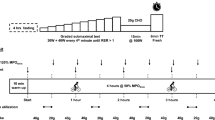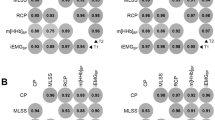Abstract
The aim of this study was to investigate the reliability of a protocol designed to simulate endurance performance in events of long duration (∼5 h) where endogenous carbohydrate stores are low. Seven male subjects were recruited (age 27 ± 7 years, VO2max 66 ± 5 ml/kg/min, W max 367 ± 42 W). The subjects underwent three trials to determine the reliability of the protocol. For each trial subjects entered the laboratory in the evening to undergo a glycogen-depleting exercise trial lasting approximately 2.5 h. The subjects returned the following morning in a fasted state to undertake a 1-h steady-state ride at 50% W max followed by a time trial of approximately 40-min duration. Each trial was separated by 7–14 days. The trials were analysed for reliability of time to completion of the time trial using a coefficient of variation (CV), with 95% confidence intervals (data are mean ± SD). The times to complete the three trials were 2,546 ± 529, 2,585 ± 490 and 2,568 ± 555 s for trials 1, 2 and 3, respectively. The CV between trials 1 and 2 was 4.5% (95% CI 2.9–10.4%) and between trials 2 and 3, 3.8% (95% CI 2.4–9.9%). There was no difference in oxygen uptake, respiratory exchange ratio, carbohydrate oxidation, fat oxidation, plasma glucose concentration and plasma lactate concentration between the three trials. Therefore we can conclude that prior glycogen depletion does produce a reliable measure of performance with metabolic characteristics similar to ultraendurance exercise.


Similar content being viewed by others
References
Astrand P, Rodahl K (1986) Textbook of work physiology, 3rd edn. McGraw Hill, London
Atkinson G, Nevill AM (1998) Statistical methods for assessing measurement error (reliability) in variables relevant to sports medicine. Sports Med 26:217–238
Bland JM, Altman DG (1986) Statistical methods for assessing agreement between two methods of clinical measurement. Lancet 1:307–310
Bonen A, Malcolm SA, Kilgour RD, Macintyre KP, Belcastro AN (1981) Glucose ingestion before and during intense exercise. J Appl Physiol 50:766–771
Coggan AR, Coyle EF (1987) Reversal of fatigue during prolonged exercise by carbohydrate infusion or ingestion. J Appl Physiol 63:2388–2395
Hopkins WG (2000) Measures of reliability in sports medicine and science. Sports Med 30:1–15
Hopkins WG, Schabort EJ, Hawley JA (2001) Reliability of power in physical performance tests. Sports Med 31:211–234
Horowitz JF, Mora-Rodriguez R, Byerley LO, Coyle EF (1997) Lipolytic suppression following carbohydrate ingestion limits fat oxidation during exercise. Am J Physiol Endocrinol Metab 273:E768–E775
Jentjens RL, van Loon LJ, Mann CH, Wagenmakers AJ, Jeukendrup AE (2001) Addition of protein and amino acids to carbohydrates does not enhance postexercise muscle glycogen synthesis. J Appl Physiol 91:839–846
Jeukendrup AE, Wallis GA (2005) Measurement of substrate oxidation during exercise by means of gas exchange measurements. Int J Sports Med 26(Suppl. 1):S28–S37
Jeukendrup A, Saris WHM, Brouns F, Kester ADM (1996) A new validated endurance performance test. Med Sci Sports Exerc 28:266–270
Krebs P, Powers S (1989) Reliability of laboratory endurance tests. Med Sci Sports Exerc 21:S10
Kuipers H, Keizer HA, Brouns F, Saris WHM (1987) Carbohydrate feeding and glycogen synthesis during exercise in man. Pflügers Arch 410:652–656
Laursen PB, Shing CM, Jenkins DG (2003) Reproducibility of a laboratory-based 40-km cycle time-trial on a stationary wind-trainer in highly trained cyclists. Int J Sports Med 24:481–485
Maughan RJ, Fenn CE, Leiper JB (1989) Effects of fluid, electrolyte and substrate ingestion on endurance capacity. Eur J Appl Physiol Occup Physiol 58:481–486
Palmer GS, Dennis SC, Noakes TD, Hawley JA (1996) Assessment of the reproducibility of performance testing on an air-braked cycle ergometer. Int J Sports Med 17:293–298
Rauch HG, Hawley JA, Noakes TD, Dennis SC (1998) Fuel metabolism during ultra-endurance exercise. Pflugers Arch 436:211–219
Smith MF, Davison RC, Balmer J, Bird SR (2001) Reliability of mean power recorded during indoor and outdoor self-paced 40 km cycling time-trials. Int J Sports Med 22:270–274
Vogt S, Heinrich L, Schumacher YO, Blum A, Roecker K, Dickhuth HH, Schmid A (2006) Power output during stage racing in professional road cycling. Med Sci Sports Exerc 38:147–151
Widrick JJ, Costill DL, Fink WJ, Hickey MS, Mcconell GK, Tanaka H (1993) Carbohydrate feedings and exercise performance: effect of initial muscle glycogen concentration. J Appl Physiol 74:2998–3005
Williams C, Nute MG, Broadbank L, Vinall S (1990) Influence of fluid intake on endurance running performance. A comparison between water, glucose and fructose solutions. Eur J Appl Physiol Occup Physiol 60:112–119
Acknowledgment
This study was supported by a grant of GlaxoSmithKline Consumer Healthcare UK.
Author information
Authors and Affiliations
Corresponding author
Rights and permissions
About this article
Cite this article
Currell, K., Jentjens, R.L.P.G. & Jeukendrup, A.E. Reliability of a cycling time trial in a glycogen-depleted state. Eur J Appl Physiol 98, 583–589 (2006). https://doi.org/10.1007/s00421-006-0305-7
Accepted:
Published:
Issue Date:
DOI: https://doi.org/10.1007/s00421-006-0305-7




